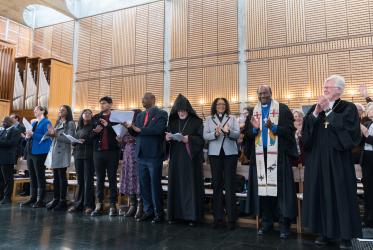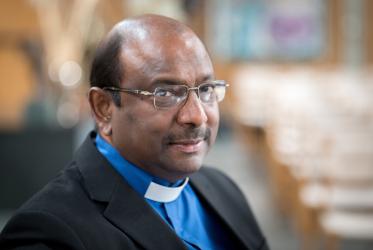Text: Genesis 1:1-5
Sermon at the Chapel of the Ecumenical Centre by:
WCC general secretary Rev. Dr Olav Fykse Tveit
9 January 2012
God of life! This is the first part of the theme for the Assembly of the WCC next year. The ecumenical movement is in a special way shaped by faith in God, the creator--God of life. Therefore, it is a special gift to us from God that we can start this year by listening to the words of creation, the words about creation, the creative words.
God is creating life by creating light, and by bringing order - separating light from darkness, day from night.
God wills life and order, by creating life, new life, every day, every year.
God is inviting you and me to be part of this movement of creation, of the new creation, every day, every year.
God is the God of the life-giving word. The first verses of the book called Genesis, the beginning, are about the power to create light and order in darkness and chaos - by words!
At the beginning of this year, God is inviting you and me to participate in the formulation and use of words of creation, words giving life, to communicate light and order in darkness and chaos.
God is the God of the Spirit, the omnipresent Spirit, able to be present everywhere, present even in all kinds of chaos. The breath of God is giving life in our entire world, every day, every year. The Spirit of God is moving the whole world, the oikoumene, and therefore also the churches, which are us, the women and men in the churches.
The first to be said about this world, about life, is to be said about God, God of life; God the will of life, God the word of life, God the Spirit of life. In this trinity of the God of life, everything is potentially present.
This wonderful poem about the beginning, which we find in the first chapters of the Bible where no human beings were present, is, however, a text that involves us most profoundly in relation to everything that is. Even before the verses about the creation of human beings as male and female, we are involved in the text by the reflection on how creation has to do with a will, a breath, a word. The whole of creation is seen as a result of relations, of communication, of God willing something new, being present through the Spirit, acting through the Word.
Yesterday was the 100th Anniversary of ANC. The movement started in a church in South Africa and became the leading party in the process to overcome apartheid. On a news show yesterday, I saw a film from the 20s with people carrying their posters in demonstrations. One of them had the text: “Freedom in our time.” Probably none of them lived long enough to experience this freedom with apartheid falling and the first black President of South Africa elected. The dream, through the definition of what was needed, was absolutely necessary to start the process, the creative process, the process of bringing the order of justice and peace. The dream had to be followed by realistic words, by protests, by tough decisions, by sacrifices, by actions that were very difficult to define. The “Yes” had to be followed by several instances of “No”. The ecumenical movement has in a very special way been shaped by this process of fighting racism. The Programme to Combat Racism has given identity to this movement as a movement of creation, honouring God’s creation, affirming the equal dignity and rights of every human being, bringing light in darkness and order in injustice and disorder, and uniting the churches – bringing together dreams and hard work.
All creation starts with a dream.
This Is the Dream
This is the dream we carry through the world
that something fantastic will happen
that it has to happen
that time will open by itself
that doors shall open by themselves
that the heart will find itself open
that mountain springs will jump up
that the dream will open by itself
that we one early morning
will slip into a harbour
that we have never known.[1]
The poet behind these words was taking care of a small farm and an orchard, just like my grandmother, a widow living in the next village, having no vision or possibility of becoming rich from farming. He struggled with bouts of depression, spending periods in institutions for patients with psychiatric problems. The dream is often born in darkness but meant for the light. The words of creation need both the dream and the realism to be creative, to bring real light.
Our words, our daily use of words, used in worship or in discussions, in the chapel or in the cafeteria, in publications or in small talks, are all means of communication that can become means of creation. They can become the words creating and bringing light, even as - or just as - they are spoken in darkness, or they can be the words bringing darkness. They can be words building up, or tearing down. They can be the words of salt, or only the words of empty sweetness. They can be the words of empowering comfort, or the words of destructive denial or ignorance of one another’s contributions and work. Words can be difficult but still necessary to make changes. Our words are not perfect. That is the challenge for all of us. Still, our words should speak both of dreams as well as reality - to be creating and creative.
But, isn’t it too simple, even perhaps disrespectful, to talk about our words when we start our year reflecting on the powerful words and the omnipresent Spirit of the God of life?
Texts like the one we listened to from the book of Genesis, the book of beginning, do themselves create humility, respect, a deeper understanding, a stronger love to everything created, and a new will to order our lives for the purpose of life. The text is not neutral, it includes us, and it does not leave us merely as outside spectators. The words help us to take the very important steps of seeing, understanding, and acting. Creation is something we are called to be part of - through our stewardship and protection. Our relations to God, to creation, and to other human beings are shaped by words like these. The text even gives the rhythm of a week as a pattern for human life in need of work and of rest.
We are drawn into the good news, into the gospel of creation: Life is a gift of light, a gift from God. This is the most mysterious and still the most real dimension of everything: Life is given to us, in the secret darkness of my and your mother. And life can only be received as a gift—a gift to be given-to others, for others.
The ecumenical movement is the movement of creation. We are participating in a movement that is called to bring the churches to a fellowship where they see their common role in participating in the wholeness of God’s work. It is a movement with great ambitions: Not only to be Church together, but to improve the churches’ witness in the world, to change the world particularly in the creation of God.
“Man’s Disorder and God Design”--this theme of the first Assembly of the WCC, Amsterdam 1948 -- clearly shows how the actors in this movement always have understood the unity of the Church as belonging to the wholeness of life given to us by God the creator of life. The allusions to the first verses and chapters of Genesis in this first theme of the Assemblies of the WCC empower us still today, when we now plan and look forward to the 10th Assembly in Korea next year.
As in the story of creation, the light was called forward in darkness but, quite remarkably, without removing darkness--bringing order. Even darkness was brought into the order of creation. In all creation, there is darkness and a shifting between light and darkness. In all creative activity there is a moment of giving life, even to the extent of death, for others. The law of life is the law of the seed. Something has to be given to give life. Therefore, the ecumenical movement of creation will always also be the ecumenical movement of the cross.
In practical terms, through our work and our words, in our relations and our institutions, with our skills and our capacities, we pray: God of life, lead us to justice and peace! …Every day… Every year. AMEN
[1] Hauge, Olav H. The Dream We Carry: Selected and Last Poems of Olav H. Hauge/ , Translated by Robert Bly and Robert Hedin. Port Townsend, Washington, Copper Canyon Press 2008.


